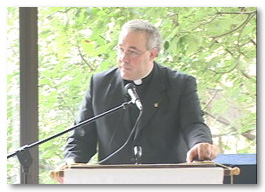Government restrictions will eliminate spirituality that makes religious programs work
- REV. ROBERT SIRICO
Effective private charities focus on human and spiritual, not just material needs.
 |
Rev.
Robert A. Sirico |
Many clergy gathered at a conference in Lansing last week where Gov. Jennifer Granholm announced the creation of a new state office for faith-based programs. One news report had the governor saying state government and religious groups "sing out of the same hymnal" when it comes to caring for the poor and vulnerable.
I'm not sure what hymnal they're using in Lansing, but I know the governor's statement gravely misrepresents the proper role of both church and state. It also misses the essential point about parceling out government funds whether the source is the state or federal treasury to faith-based organizations.
Governments at all levels have for decades contracted with church affiliated organizations, such as Lutheran Social Services or Catholic Charities. These organizations go to great lengths to separate their services from their religious mission, and not always in a manner that is beneficial to the poor.
It is contrary to the nature of religious charities to draw a stark line between their faith and their works. Churches and other faith groups assist those in need not because they wish to become an appendage of the state, but because their faith demands it.
Where faith-motivated service sees the person as a living icon of God, the state sees a case number or a client. Faith-based help for the poor and needy often works best when material help has proven a failure. That's because religious groups understand how to address the deepest needs of the spirit. The government is clueless here.
Religious groups that have won government funding have often wound up regretting the red tape and lack of flexibility that comes with receiving taxpayer dollars. One of the sessions at the governor's Lansing conference was titled, "Grants, Contracts and How to Become a Vendor with the State of Michigan." This is very revealing of the bureaucratic mind-set. Is there a church, synagogue or mosque in this state that views its mission as just another vendor of state services? For Christians, who understand the Church as the Body of Christ, this mentality is a disaster.
Granholm has already served notice that, in her faith-based system, churches won't be able to preach the Gospel while delivering services or hire people based on their religious belief. Does the state then reserve the right to dictate to religious groups that they must hire even those who do not share their most fundamental beliefs, or beliefs that are antagonistic to their faith?
That is precisely what has been the issue with faith-based programs since their inception. What the state seems incapable of understanding is that religious groups should be free to make hiring decisions based on their deepest beliefs about God and the human person. Those who want to use the coercive power of the state to restrict the hiring practices of religious groups are in fact the ones seeking to impose an ideological belief on others.
Religious leaders who might be seduced by state funding should also understand the fiscal and political realities. First, faith-based initiatives whether federal or state do not represent new money. They merely allow religious groups to compete for government funding. The state, by the way, is in a severe funding crisis.
Second, faith-based initiatives are promoted by politicians, not saints. Politicians do things for political ends and expect just compensation for their favors.
Effective private charities focus on human and spiritual, not just material needs. Religious groups would do well by shunning faith-based funding and the state control that comes with it. That way, they can answer obligations of faith with a free conscience.
 This is Fraser Field, Founder of CERC. I hope you appreciated this piece. We curate these articles especially for believers like you.
This is Fraser Field, Founder of CERC. I hope you appreciated this piece. We curate these articles especially for believers like you.
Please show your appreciation by making a $3 donation. CERC is entirely reader supported.

Acknowledgement
Rev. Robert A. Sirico. "Government restrictions will eliminate spirituality that makes religious programs work." Detroit News: Faith and Policy (March 20, 2005).
Reprinted with permission of the author Rev. Robert A. Sirico.
The Author

 Father Sirico is president of the Acton Institute for the Study of Religion and Liberty in Grand Rapids, Mich. Father Sirico is often called upon by members of the broadcast media for statements regarding economics, civil rights, and issues of religious concern. He is the author or co-author of Defending the Free Market: The Moral Case for a Free Economy, The Call of the Entrepreneur Study Guide, Catholicism Developing Social Teaching, The Free Person and the Free Economy: A Personalist View of Market Economics, Capitalism, Morality & Markets, Skepticism, Faith, and Freedom, A Moral Basis for Liberty, Catholicism's Developing Social Teaching, and Environmentalism and its Spiritual Implications.
Father Sirico is president of the Acton Institute for the Study of Religion and Liberty in Grand Rapids, Mich. Father Sirico is often called upon by members of the broadcast media for statements regarding economics, civil rights, and issues of religious concern. He is the author or co-author of Defending the Free Market: The Moral Case for a Free Economy, The Call of the Entrepreneur Study Guide, Catholicism Developing Social Teaching, The Free Person and the Free Economy: A Personalist View of Market Economics, Capitalism, Morality & Markets, Skepticism, Faith, and Freedom, A Moral Basis for Liberty, Catholicism's Developing Social Teaching, and Environmentalism and its Spiritual Implications.


